Return to Naval Historical
Center home page.  Return
to Online Library listing
Return
to Online Library listing

DEPARTMENT OF THE NAVY -- NAVAL HISTORICAL CENTER
805 KIDDER BREESE SE -- WASHINGTON NAVY YARD
WASHINGTON DC 20374-5060

Archive of Older "What's New in the Online Library of
Selected Images?" --
Entries posted in March & April 2002
This page features March & April 2002 entries from the Online
Library's "What's New?" section.
For the more recent entries, and links to previous years' entries,
see:
What's New in the Online Library
of Selected Images;
For earlier entries from the year 2002, see:
What's New in the Online Library
of Selected Images? -- Entries posted in January & February 2002

- New subjects added during the final full week of April include
four World War II era U.S. Navy ships, three more from World
War I as well as one from the Civil War, plus a Japanese destroyer
and a Navyman who received the Medal
of Honor for heroism in 1904.
Our new WWII ships include the light cruiser Brooklyn
(CL-40), destroyers Farragut
(DD-348) and Phelps
(DD-360), and the small seaplane tender Suisun
(AVP-53). The new Japanese ship is a near-contemporary: the
destroyer Akatsuki.
The World War I era ships include the tug Adelante
(a very rare creature indeed -- a tug converted from a yacht),
ferryboat Narragansett,
and the yacht Narada.
From the Civil War era, we have the interesting ironclad torpedo
boat Spuyten Duyvil.
The presentation on the latter includes a link to a rather lengthy
contemporary description
of the vessel.
Our Medal of Honor winner is Lieutenant Mons
Monssen, for whom two destroyers were named during World
War II.
29 April 2002
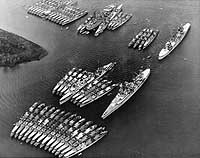
- The Online Library's latest offerings include a 19th Century
entrepreneur and two of his ships, plus the usual outpouring
of 20th Century vessels.
Taking the last first -- we added a presentation on USS Tuscaloosa
(CA-37), which completes our efforts to get all of the U.S.
Navy's pre-World War II heavy cruisers "on line". We'll
now get after the contemporary light cruisers. Two U.S. Navy
destroyers also made their appearance, the late 1930s vintage
Preston (DD-379)
and the World War I program's Southard
(DD-207), which served during World War II as a high-speed
minesweeper (DMS-10). Our foreign offering for the week is the
Japanese light cruiser Yura.
Other World War I era ships include the transport Nansemond,
cargo ship Nantahala,
and two barges: Nahunta
and Addie & Carrie.
The 19th Century is represented by the noted businessman Edwin A. Stevens, who
shared responsibility for orginating the technologically advanced
(but never completed) "Stevens
Battery" and the much smaller gunboat Naugatuck.
The latter might (in modern vernacular) be regarded as a "technology
demonstrator" for the former.
22 April 2002

- Tax season deadlines and other springtime delights have conspired
to diminish the past week's Online Library output. However, an
officer and a modest number of new ships joined the ranks. Our
new person, Commodore Frank
W. Bartlett, was an engineering officer whose long active
career ran from 1874 until 1920. He also authored the entertaining
manuscript "Naval
Yarns", which can be seen elsewhere in the Naval Historical
Center's WebSite.
Freshly-posted ships represent a return to the Twentieth Century,
after our recent concentration on earlier subjects. They include
the World War II era heavy cruiser Augusta
(CA-31) and destroyer McCalla
(DD-488), plus the World War I patrol vessels Actus,
Nahma, and Zara.
15 April 2002

- Following a lengthy struggle, we can finally report the completion
of the Online Library's coverage on the March
1889 hurricane at Apia, Samoa, a presentation that includes
(either directly or via links) everything we hold on this subject.
The week's efforts also included new pages on two contemporary
officers, Rear Admirals Norman
Von H. Farquhar and Henry
L. Howison, and on USS Trenton.
The latter was lost in the Apia storm, with then-Captain Farquhar
as her Commanding Officer. Howison had commanded USS Vandalia
during 1886-88.
The rest of the week's work includes three World War I era vessels,
the patrol boat Acoma,
tug Luckenbach # 4
(later USS Nahant) and schooner Nellie
Jackson, plus our final Civil War light-draft monitor,
USS Tunxis.
8 April 2002
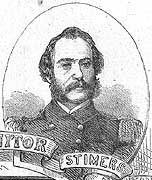
- Somewhat in the spirit of the day, we open the week's report
with a likeness (and associated pictorial coverage) on Chief
Engineer Alban C. Stimers,
a talented and energetic officer whose experiences with the Civil
War's light-draft monitor program serve as a valuable cautionary
tale for all those who undertake the difficult challenges of
Project Management.
While endeavoring to complete our work on the March
1889 hurricane at Apia, Samoa, we discovered a large number
of artworks concerning this event. Accordingly, the whole thing
has been temporarily put on ice while these images are prepared
for addition to the presentation. However, another ship and two
more people that were involved in this tragic incident have been
posted. These are the screw sloop Vandalia,
which was sunk in the storm; her Commanding Officer, Captain
Cornelius M. Schoonmaker,
who lost his life; and Commander Dennis
W. Mullan, who commanded the gunboat Nipsic
at the time.
Other items added during the past week include the World War
I era patrol boat Absegami,
barge Freight Lighter Number
60 and three craft with the same name: Mystery
of 1916, Mystery
of 1917, and Mystery
(SP-2744). Civil war contributions include the light-draft
monitors Shawnee,
Squando and Wassuc.
1 April 2002
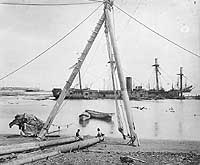
- Despite our best intentions and efforts, we didn't quite
finish our presentation on the March
1889 hurricane at Apia, Samoa. However, all the pictures
have been posted and are now available for examination, and introductory
text will follow soon. In addition, pages have been completed
on another four of the ships present during that storm, including
the U.S. Navy gunboat Nipsic
and the German warships Olga,
Adler,
and Eber.
A page was also posted on Rear Admiral Lewis
A. Kimberly, USN, who was senior officer present during the
hurricane. More relevant ships and people will be added during
the next several weeks.
While the Apia hurricane dominated the past week's work, a few
other subjects were also added. These include the World War II
patrol craft PC-489,
PC-545 and PC-574; World War I era
ships Absaroka,
Howard C. Moore
and Montclair;
the Civil War light-draft monitor Modoc;
and the German corvette Carola,
a sister ship of the Apia hurricane's Olga.
25 March 2002
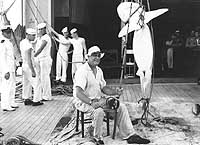
- The week just past added another doxen ships and a person
to the Online Library's offerings. Among the former are the heavy
cruiser Houston (CA-30),
destroyer Hughes (DD-410),
and transport Heywood
(AP-12, later APA-6), all of which served during the Second
World War I. Ships from the First World War include cargo ship
Independence (ID #
3676), patrol vessels Mohican
(which was named SP-117 during most of her Naval service)
and Abalone (SP-208),
and the tug Montauk
(SP-1213). The week's Civil War era ship are all light-draft
monitors: Chimo,
Napa, Naubuc
and Nausett.
Our person this week is Captain Albert
H. Rooks, who was posthumously awarded the Medal of Honor
for his service as USS Houston's Commanding Officer during
the East Indies campaign of February 1942.
Finally, we posted a page on the British Royal Navy corvette
(or cruiser) Calliope,
of 1884. This ship represents the initial gust of forthcoming
coverage on the great Samoan hurricane of March 1889.
18 March 2002
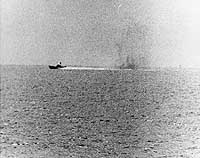
- Spring appears to be upon us, at least here in the Washington
area, bringing with it (for no logically related reason) another
batch of new Online Library postings. As has generally been the
case of late, most are ships involved with the World War II Guadalcanal Campaign.
These include the Australian heavy cruiser Australia,
U.S. Navy light cruiser Honolulu
(CL-48); USN destroyers Walke
(DD-416), Gwin
(DD-433) and Lansdowne
(DD-486); plus the transports Neville
(AP-16, later APA-9) and President
Jackson (AP-37, later APA-18). Other World War II ships
added are the small seaplane tender Shelikof
(AVP-52) and destroyer Maddox
(DD-731). The later had a major role in the August 1964 Tonkin
Gulf Incident, and views related to that event are included in
our presentation on her.
As might be expected, we also put in a few items from World War
I and the Civil War. The "Great War" representatives
are the refrigerator ship Moccasin
(ID # 1322) and patrol boat Mist
(SP-567). From the Civil War are the light-draft monitor
Casco and Confederate
ironclad Columbia.
11 March 2002
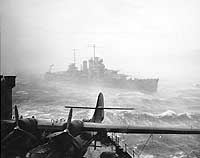
- New items posted during the final days of February and the
first few days of March include presentations on two of the Navy's
notable heros, and several ships. World War II vessels among
the latter are the heavy cruiser Wichita
(CA-45); destroyers Ellet
(DD-398) and Hoel
(DD-533); oiler Kaskaskia
(AO-27) and the small seaplane tender San
Carlos (AVP-51), which later became the research ship
Josiah Willard Gibbs
(T-AGOR-1).
Patrol boats Miss
Toledo (SP-1711) and SP-672
(ex-Miramar) represent the First World War, while the
Civil War's contribution is the light-draft monitor Yazoo.
Our new people include the Civil War Western Rivers' Campaign
hero Acting Volunteer Lieutenant Commander William
R. Hoel, for whom USS Hoel was named, and posthumous
Medal of Honor recipient Elmer Charles Bigelow,
in whose honor USS Bigelow (DD-942) was named.
4 March 2002
This page features March & April 2002 entries from the Online
Library's "What's New?" section.
For the more recent entries, and links to previous years' entries,
see:
What's New in the Online Library
of Selected Images;
For earlier entries from the year 2002, see:
What's New in the Online Library
of Selected Images? -- Entries posted in January & February 2002
 Return to Online Library listing.
Return to Online Library listing.
Page made 6 May 2002
 Return
to Online Library listing
Return
to Online Library listing
 Return
to Online Library listing
Return
to Online Library listing
